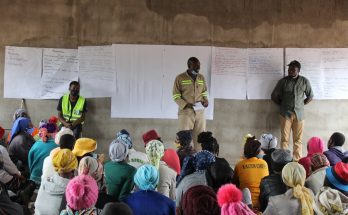By Blessing Bonga and Kudakwashe Pembere
ZIMBABWE, which in the not so distant past was battered by natural hazards such as droughts and cyclones should look into adopting climate smart agriculture (CSA) technologies, a senior World Bank official has said.
In 2019, the country was heavily affected by the Cyclone Idai which many of the affected areas are still trying to recover from. This year, Cyclone Freddy which damaged Malawi also affected Zimbabwe to a lesser extent though.
Addressing a breakfast meeting on Climate Smart Agriculture organized by the Diplomat Business Networking Club earlier this week, World Bank Acting Country Director Ms Fadzai Mukonoweshuro said it was about time the country began to look into climate smart agriculture innovations.

“Here in Zimbabwe the need for CSA technologies is particularly urgent,” she said.
The World Bank has been observing the occurrence of extreme weather events from ten years to two in Africa, which calls for robust climate mitigation initiatives.
“The frequency of extreme weather events compromising food security has increased dramatically, from occurring every 10 years in the past to now happening every two and a half years.
“This rapid acceleration is far too frequent for any farm or farmer to recover from, hence increased food insecurity.
“Zimbabwe’s vulnerability to natural hazards and broader climate change impacts is very high, necessitating a focus on climate adaptation,” she said.
ND-GAIN measures overall vulnerability by considering six life-supporting sectors — food, water, health, ecosystem service, human habitat and infrastructure.
“Previous assessments highlight Zimbabwe as a climate change hotspot along other southern African countries with Zimbabwe ranking 174 out of 182 countries on the ND gain index which ranks vulnerability to and ability to adapt to climate change,” said the World Bank official.
Ms Mukonoweshuro noted that the country could put its agricultural research prowess to use for climate change adaptation.
“The good news is that Zimbabwe has a vibrant history in investment in agricultural research and extension involving the private and public sector. The government’s commitment to an enhanced agriculture and knowledge innovation system to drive adaptation and mitigation in the sector is seen through for instance its Pvumvudza program built on conservation and agriculture principles. The higher yields of farmers in the program as shown in crop and livestock assessment reports is able to evidence itself on how such innovations can be a game changer to the agrifood systems,” she said.
“Each drought and flood are estimated to lead to a 1.4% annual reduction in food calories and a 5-20% decline in food security. This places a colossal US$43 billion annual import food bill on the continent.”
Added Ms Mukonoweshuro, “The Bank is currently scaling up CSA based on its commitment in its Climate Change Action Plan (2021-2025) and the Climate Africa Business Plan to deliver CSA that achieves the triple win of increased productivity, enhanced resilience, and reduced emissions.
In 2021, 52 percent of World Bank financing in agriculture targeted climate adaption and mitigation.”
Agriculture deputy minister Davis Marapira said government and other stakeholders must establish comprehensive and adaptive policies to enable farmers to cope with changing environmental conditions.
“The government is committed to supporting the agricultural sector, particularly small-scale farmers and we are witnessing positive responses to our current and planned programmes aimed at spurring transformation and supporting climate-smart initiatives,” he said.
Indian Ambassador to Zimbabwe Mr Vijay Khanduja said the Climate Resilience Agriculture project has helped villagers in Chiredzi and Mangwe.
“Specifically coming to the Agriculture sector, we have provided USD1 million from the India-UN Development Partnership Fund for the Climate Resilience agriculture projects in the districts of Chiredzi and Mangwe.
“The project is complete and (the money) was provided in 2021. I myself visited Chiredzi to see the project first hand and the training that has been provided through the UN agencies which are WFP and FAO and people were very happy,” he said.




